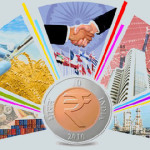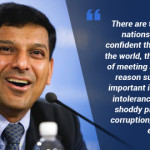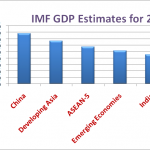
Sharad Joshi: An Economist Who Worked for India’s Farmers
Exiting 2015, India lost one of her free market champions, Sharad Anantarao Joshi. At a time when farmer suicides are becoming rampant across the nation, someone like Joshi, with his ideas for agriculture, will be sorely missed. Many have called

What Lies in Store for the Indian Economy?
In an interview with Indian Express, in November 2015, Finance Minister Arun Jaitley said, “The biggest strength of India and the silver lining is its resilience. Our systematic firewalls have to be such that the ability to resist the

Free Market Advocacy Think Tanks in India
Free market thinkers could be largely categorized into three distinct types – Anarchists, Minarchists and Minimaxes, representing varying degrees of government control. The Anarchists, as evident from the name, believe in zero intervention

What does the Free Market Economist Arvind Panagariya Plan for India?
According to an article in The Hindu, published on January 13, 2015, Arvind Panagariya became the first Vice-Chairman of the Niti Aayog.

Raghuram Rajan: Backing India’s Dream to Reach for the Stars
According to a report in CNN IBNLive, published on January 13, 2015, Raghuram Rajan the Governor of the Reserve Bank of India (RBI),

What does the Narendra Modi Government mean for the Indian Economy?
“India has won. Good times ahead.”
This is what Narendra Modi tweeted when his party achieved an irrefutable lead in the elections earlier this year. Now that Modi has formed his government at the centre, what does the new government have in store for the third largest economy in Asia?

What Does 2014 Have in Store for the Indian Economy?
While presenting the interim budget for fiscal 2014-15, Finance Minister P. Chidambaram said in the Lok Sabha, “I wonder how many have noted the fact that India’s economy, in terms of the size of its GDP, is the 11th largest in the world. There are great things in store.”

In India, ‘Economic Equality’ Continues to be Just Arm-Chair Idealism
“Inequality in India has grown faster in the last 10-12 years than in any other time in our history since the colonial raj.”
– P. Sainath, Senior Journalist and Rural Affairs Editor, The Hindu
We have all heard a lot of talk about the need for “inclusive growth” in India, especially in the last few years – ever since the powers that have had to face the deafening “anti-corruption” music, what with a barrage of multi-million dollar scams being exposed every other day by the increasingly activist television media of the country. One could ask – wasn’t that exactly what we set out to achieve more than 60 years ago? Wasn’t that the whole point of fighting the colonialists tooth and nail for freedom? Doesn’t political independence entail socio-economic independence too? The fact is – economic equality has become a victim of malevolent, ill-conceived, unnecessary, and overzealous government intervention into the economic lives of the people of the union.
Foreign Direct Investments in the Indian Economy
In the pre-liberalization era, Foreign Direct Investments (FDIs) into India were plagued by several restrictions. This included ceilings on foreign equity, restrictions on the use of brand names, restrictions on the expansion of investments into consumer goods and several others. To add to the miseries was the Industrial Licensing System. In 1991, many of these impositions were either abandoned or significantly eased, paving the way for FDIs to boost India’s economic growth.

India to Slide from Position of Second Fastest Growing Economy
The Asian Tiger seems to be getting into the crouching position again. It seems to be moving further and further away from the Dragon. While her neighbour China continues to rule the roost, India has moved down from its prestigious position as the world’s second fastest growing economy. According to the International Monetary Fund (IMF), India’s growth in 2012 will be reported at 4.5%. This is disappointing, since we were all out to cheer for the country surpassing its larger neighbour in terms of economic growth.
 Rakesh Wadhwa. Ever since, I was a school boy, I knew India was on the wrong path. Socialism was just not what we needed to get ahead. Government controlled our travel; government controlled our ability to buy and sell; and government controlled our freedom to move our money. My life has focused on the inherent rights people have. When I was in college, I never understood, what the governments meant by their "socialistic attitude". If people are free to buy, sell and move their capital themselves without any restrictions by state, then the welfare of people is inevitable & hence the countries they live in will become wealthy. The government has no right whatsoever, to point a finger at me or my business. I am not a revolutionary. I just want to light up my cigarette and not get nagged about it. I believe in non-interfering attitude to attain more.
Rakesh Wadhwa. Ever since, I was a school boy, I knew India was on the wrong path. Socialism was just not what we needed to get ahead. Government controlled our travel; government controlled our ability to buy and sell; and government controlled our freedom to move our money. My life has focused on the inherent rights people have. When I was in college, I never understood, what the governments meant by their "socialistic attitude". If people are free to buy, sell and move their capital themselves without any restrictions by state, then the welfare of people is inevitable & hence the countries they live in will become wealthy. The government has no right whatsoever, to point a finger at me or my business. I am not a revolutionary. I just want to light up my cigarette and not get nagged about it. I believe in non-interfering attitude to attain more. 
 The Bastiat Award is a journalism award, given annually by the International Policy Network, London. Bastiat Prize entries are judged on intellectual content, the persuasiveness of the language used and the type of publication in which they appear. Rakesh Wadhwa won the 3rd prize (a cash award of $1,000 and a candlestick), in 2006.
The Bastiat Award is a journalism award, given annually by the International Policy Network, London. Bastiat Prize entries are judged on intellectual content, the persuasiveness of the language used and the type of publication in which they appear. Rakesh Wadhwa won the 3rd prize (a cash award of $1,000 and a candlestick), in 2006.
What the readers are saying…